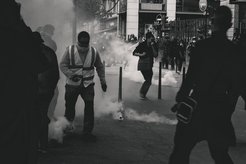Why is violence high in deprived communities?
Criminologists find out under which circumstances people are willing to exploit others
Violent crime rates vary greatly between places. In the city of Chicago, for example, the homicide rate of some neighborhoods is more than 100 times that of other areas. Not only tend the most violent places to be the most economically deprived and socially unequal, violence is also a persistent factor in these areas, even taking into account resident turnover or an improvement of the economic situation. While these phenomena are well established, the reasons underlying them are far from clear. With their new publication, Why is violence high and persistent in deprived communities?, criminologists Benoît de Courson, Willem Frankenhuis, Daniel Nettle, and Jean-Louis van Gelder aim to fill this gap.

In this study, the authors—criminologists at the Max Planck Institute for the Study of Crime, Security and Law in Freiburg/Germany (de Courson, van Gelder, Frankenhuis) and at the Ecole Normale Supérieure-PSL in Paris (Nettle)—are able to show that there may be one single root cause for these phenomena. By way of a formalized computational model, de Courson and his co-researchers simulated a world in which artificial humans, “agents,” make decisions and interact. The model is innovative in that it assumes that individuals first try to meet their basic needs; i.e., to always maintain their level of resources above what the authors term a “desperation threshold”—for instance to always be able to feed their children or pay the rent. The researchers found that when people are unable to meet their basic needs, these “desperate” individuals become willing to exploit others, regardless of the consequences. They do so to at least preserve a chance of keeping their head above water. In turn, other agents (despite not having crossed this desperation threshold) resort to violence as a sign of their “toughness” in order to reduce the chances of being exploited (by desperate individuals).
“Our model explains why increasing poverty or inequality in a population lead to more violence,” says de Courson. Previous models, which did not include a desperation threshold, predicted that violence would “regulate” exploitation and restabilize the system. However, these models were unable to explain the concentration of violence in certain places that has been observed by criminologists. “Conversely, the fact that desperate agents have little left to lose fundamentally changes our results: Instead of ‘deterring’ exploitation, violence merely ‘deflects’ it to other people, thus incentivizing more violence,” the researcher adds. This dynamic makes violence contagious and creates a hysteresis effect explaining why the consequences of economic deprivation persist even once an area is no longer characterized by deprivation as such. That could explain why violent places remain violent. In the researchers’ model, two equally deprived populations may have very different levels of violence, for the sole reason that one was more disadvantaged in the past.
Put together, a “desperation threshold” and “toughness signals” can explain why violence varies so much between places, why it persists, and why poverty and inequality play an important role in these processes. This suggests that fighting poverty—specifically, eliminating economic desperation by ensuring that everyone always has enough resources to meet their basic needs—could have a positive ripple effect. The scientists are convinced: Interventions that achieve this would not only help the people who are the most economically deprived, but may also cut the roots of violence in the rest of the population.
- Benoît de Courson is a Doctoral Researcher at the Max Planck Institute for the Study of Crime, Security and Law in Freiburg/Germany (Department of Criminology).
- Dr. Willem Frankenhuis is a Senior Researcher at the Max Planck Institute for the Study of Crime, Security and Law in Freiburg/Germany (Department of Criminology) and Associate Professor of Psychology at Utrecht University in the Netherlands.
- Prof. Daniel Nettle is a Research Director at the Ecole Normale Supérieure-PSL, Paris/France.
- Prof. Jean-Louis van Gelder is Director at Max Planck Institute for the Study of Crime, Security and Law in Freiburg/Germany and Head of its Department of Criminology.
Publication:
Benoît De Courson, Willem E. Frankenhuis, Daniel Nettle, and Jean-Louis Van Gelder, "Why is violence high and persistent in deprived communities? A formal model", (2022).
